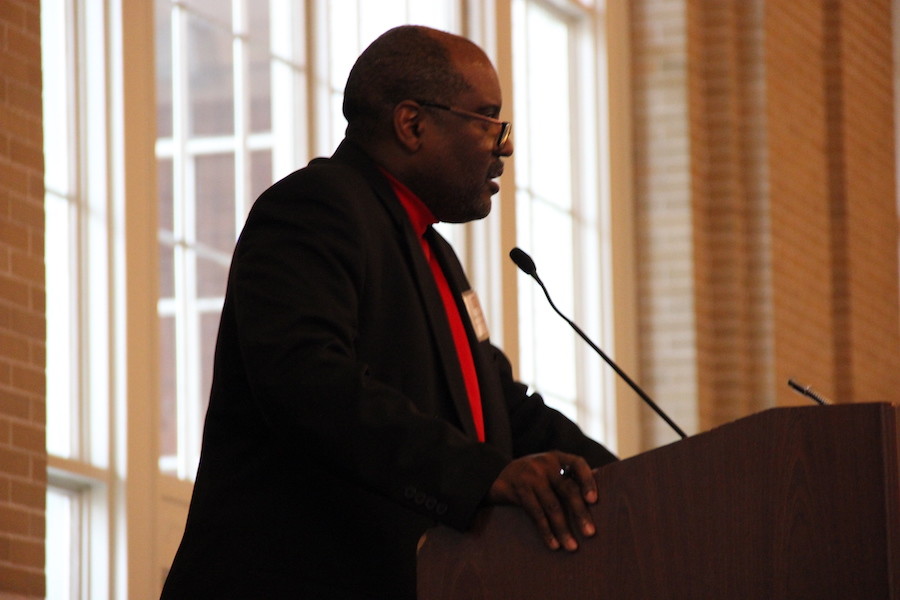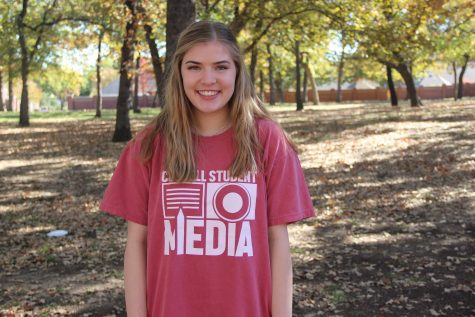Writing, reporting, and running with the big leagues: What I learned at High School Journalism Day
April 8, 2016
When my story about a drama podcast was selected as a finalist in the News Feature category of the 25th Dallas Morning News High School Journalism Day and Competition, I was excited, because someone obviously liked my writing and thought that the story was compelling and interesting enough to really stand out.
The HSJ Competition is annually held by The Dallas Morning News. High school newspapers are invited to send individual entries in categories ranging from photos to videos to sports features, as well as submissions in portfolio categories like page design and school categories like best website.
However, I did not realize that there was a HSJ Day to go along with the competition, and I became even more excited when I read the email inviting me to the event at the offices of the DMN and the downtown Union Station.
During HSJ Day, staffers from the DMN and other publications host workshops about various aspects of the newspaper, such as copy editing, page design, and opinion writing. After these workshops is the awards ceremony.
Since I am a first-year staffer, I had no idea what exactly to expect. But despite being slightly nervous, I was still interested. I wanted to learn about all the work that went into producing a newspaper full-time.
After taking the DART train to downtown, and walking to Union Station, I got to listen to the opening remarks from Selwyn Crawford, the Director of the College Internship Program, and Jim Moroney, the CEO.
Their speeches truly impressed on me the importance of journalism, and its role in disseminating information to the public. Journalism acts as the medium between the government and the public, and because of this, good, ethical journalism is key to a stable society.
After this, I went to the first workshop, Digital Newsroom/Role of a Digital Journalist, hosted by Robyn Tomlin, Managing Editor, and Sarah Blaskovich, the Entertainment Vertical Editor. The workshop discussed the increasing role that the Internet and digital tools have in journalism, and all the different ways that journalists can utilize such tools to enhance their stories.
This one was pretty fascinating, as The Dallas Morning News has access to a lot more technology than The Sidekick. Getting to see a virtual reality tour, for example, of the damage after a series of tornadoes, was incredibly immersive and can give people a much more impactful experience than simply writing about the damage. It was as if I was there at the scene of destruction.
But even if Coppell Student Media may not have virtual reality, we still have plenty of tools at our disposal. The workshop leaders showed a Snapchat story done about a visit to a furniture store, which not only makes the story more interesting but also gives exposure to the DMN. And Snapchat can be used by pretty much anyone.
I started to think about the ways that I can use social media/digital tools more in my stories. I have posted videos and infographics before, but there is so much more available. After the recent website update, you can do audio clips, reader polls, and pull quotes on Coppell Student Media, as well as many other interesting features.
And of course, there is Facebook, Twitter, Snapchat and Instagram, which a huge number of people are using every day. It is easier to get news out, because you can reach a much wider audience.
After this workshop finished, I went to The Art of the Interview, hosted by Tawnell Hobbs, Staff Writer, and Christopher Wynn, Arts Vertical Editor. This workshop discussed tips and techniques for interviewing sources for a story.
Since I feel awkward interviewing people, and lack self-confidence in this area, this workshop was particularly helpful. One thing that stood out to me was their advice to record your interviews. Since people generally talk too fast for me to write everything down, transcribing it from an audio account is a good way to avoid missing anything important.
I also thought their tips on finding sources were pretty useful. They recommended talking to not just the “higher-up people” (like the mayor or administrators) but also people like secretaries and workers. These people often know a huge amount about a subject because they’re essentially responsible for relaying such information to their bosses.
But most importantly, they talked about being ethical while interviewing. Do not be excessively pushy and aggressive about interviewing, especially if the subject is sensitive (such as the death of the family member). Make sure your interviewee knows exactly how they are going to be presented in your article.
I feel this is really important, especially because journalists sometimes get a reputation among the general public for being hungry vultures that delight in making people look bad. Establishing yourself as trustworthy is key to get people to open up to you and tell you their stories.
After these workshops, lunch was served, and Meredith Land, an anchor and reporter for NBC5, stepped up to give a guest speech.
What impressed on me most was her sheer dedication to reporting. She stayed behind to report on a hurricane while everyone else evacuated, and she often took on hard, unglamorous assignments that would earn her little recognition.
I found that particularly inspiring, and I started reevaluating my dedication to my own assignments, as well as thinking about how to do harder and more intensive stories to push my own limits and prove my commitment.
And, finally, was the awards ceremony. I ended up not winning in the News Feature category, but I was still happy because The Sidekick ended up winning Best Newspaper overall. I feel proud to have contributed my work to such an excellent publication.
Winning Best Newspaper was truly a reflection of the cumulative efforts of all the staffers on The Sidekick, and the time and effort they put into making the Sidekick the best quality possible. The level of cooperation required is amazing. Writers, editors, photographers, and graphic designers all come together to create what is basically a work of art.
Overall, High School Journalism Day taught me that there are so many opportunities in the world of journalism that I have yet to explore, and that there are so many areas for improvement, even if I have already come very far.











